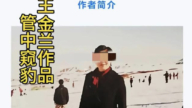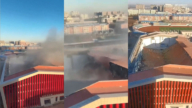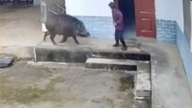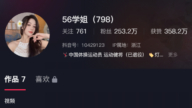【新唐人2014年06月26日讯】四年前,在德国斯图加特市抗议的示威者遭到警方强制驱离,一些受伤的抗议者将警察告上法庭,其中,针对批准警方使用高压水枪行动的负责人案件于日前开庭,两名负责人被控过失犯罪。分析人士指出,相较于德国,中国大陆在中共的专政下,法律形同虚设,甚至“公检法一家”,暴力执法的警察很少被追究。
2010年9月30号,德国一名退休人员瓦格纳(Dietrich Wagner)在斯图加特市御花园,对有争议性的火车站改建项目表示抗议,警察使用高压水枪对付他,导致69岁的他几近失明。
瓦格纳的律师弗兰克•乌尔里希•曼(Frank Ulrich Mann)向《德国之声》表示,他的当事人亲眼看到,警察如何向儿童喷洒胡椒水,并使用高压水枪瞄准示威者的头部,他的当事人要求将责任人绳之以法。
目前有四名警察接到处罚令。6月24号,针对两名警方行动负责人的案件开庭,他们因批准使用高压水枪,被控过失犯罪。
时事评论员汪北稷:“民主国家的警察处理群体事件示威抗议,有它的执法的权力跟范围,但是不管怎么样,不能过分的使用暴力,对比中国大陆的警察,在过去许多年的维权事件、集体事件当中,动辄使用暴力,或者抓进去以后使用酷刑,这个和中国大陆的法治的完全失控是很有关系的,中国大陆的法律是形同虚设。”
据了解,浙江杭州市余杭区中泰乡的村民,为了抵制在当地兴建亚洲最大的垃圾焚化炉,5月10号下午,近3万村民走上“杭徽高速公路”抗议,遭到杭州警方暴力镇压,两村民被打死,一名小孩被摔死,数十人受伤被送往医院抢救。
5月11号,余杭区法院、检察院、公安分局与司法局联合发布所谓“重要播报”,要求所谓的犯罪行为人主动投案,否则依法严惩,并发放15名犯罪嫌疑人的照片。
中国大陆律师唐吉田:“在民主国家,警察权的使用是有严格的程序,有非常具体的规定,像中国大陆,可以说到目前为止,由于制约和监督机制缺乏或者是不起作用,警察权的扩张、滥用对社会造成损害的情形时有发生,虽然也有一些规定对他们进行处理,但是由于一些行为是长官意志造成的,实际上相当多的责任没有追究,很多人也就认为,只要有头头撑腰,不必有什么顾忌。”
3月30号,广东茂名市民开始走上街头,抗议兴建具有危害性的“对二甲苯”(PX)化工厂。当局出动大批警力暴力镇压。有15人死亡、数百人受伤。
4月23号,茂名市警方宣称,已刑事拘留24人,检察机关批准执行逮捕5人﹔行政处罚36人,其中送社区戒毒2人。
广州市白云区原派出所副所长陈军育:“警察他是没人管的,公检法都是一家的,司法又不独立,新闻媒体也不是独立的,所以他们就是倚仗着这一点耍赖,没有人追究,有恃无恐。”
前《陕西电视台》编辑马晓明透露,去年3月8号,他遭到警方非法抓捕,并被殴打。警察还向他念毛泽东语录,他认为,警察暴力执法的根源,在于毛泽东开创的专制体制被沿用下来。
前陕西电视台编辑马晓明:“警察在毛泽东已经去世30几年的情况下,还居然拿毛泽东的语录作为依据,来对我进行违法的抓捕和审问,这就说明,虽然文化革命以后,对毛泽东所谓的功过进行了评定,但是毛泽东的巨大罪过,对历史巨大的破坏,没有得到彻底清算,它开创的专制体制沿用下来了,这就是中共的统治下,警察非法的暴力频频发生的最根本的原因。”
时事评论员汪北稷指出,中共靠暴力革命起家,中共从高层到基层,都没有放弃使用暴力来解决问题。目前在中国大陆,很多民众在无路可走的情况下,也选择使用暴力来反抗中共的统治。
采访/陈汉 编辑/陈洁 后制/陈建铭
German Police Tried For Violence, What About Chinese Police Brutality?
Four years ago, demonstrators were injured when
a Stuttgart, Germany protest was dispersed by police.
Later, the protesters sued police.
The court case against the responsible officers
recently went to trial.
Two officers were accused of negligence.
Analysts say that China’s law, under the Chinese Communist
Party’s (CCP) rule, is useless compared with Germany’s.
The Public Security, the Procuratorate and the Court shield
each other, and violent police are rarely brought to justice.
On Sept. 30, 2010, German retiree Dietrich Wagner was
protesting a controversial train station reconstruction plan.
Police used a water cannon to strike him in the face,
nearly blinding the 69-year-old.
Wagner’s lawyer Frank Ulrich Mann
was interviewed by Deutsche Welle.
He said that his client witnessed pepper spray
being used on children.
Police also targeted the heads of protesters
with water cannons.
Mann says that his client sought justice.
So far, an order of summary punishment has been filed
against four police officers.
On June 24, two officers responsible for the use of water
cannons were tried and accused of negligence.
Wang Beiji, current affairs commentator: “Police in
democratic countries have their limitations
in handling protests.
The police cannot use excessive violence.
In China, for many years, police frequently use violence
to handle protesters, or torture protesters after detainin"
Sources say that on May 10 villagers in Hangzhou, Zhejiang
protested against a planned waste incinerator.
Nearly 30,0000 villagers protested on a motorway.
Police dispatched to the site violently suppressed protesters.
Two villagers and one child were killed.
Dozens injured were rushed to hospital.
On May 11, the local police, the court and the Procuratorate
jointly issued a notice demanding alleged criminals
to voluntarily surrender, otherwise, severe punishment
would apply.
Meanwhile, photos of 15 “suspects" were published.
China-based lawyer Tang Jitian: “In a democratic country,
there are strict and detailed police procedures.
In China, supervision institutions don’t play their role.
Police have expansive power and often casually abuse
their rights, damaging society – this is a frequent occurrence.
Although some regulations are in place to deal with them,
some actions were ordered by their superiors,
so the majority haven’t been punished.
Many people believe that as long as their superiors
shield them, there is no need to worry."
On March 30, citizens of Maoming, Guangdong protested
against plans for a chemical plant (PX).
Police were dispatched en masse to the site
where they violently suppressed demonstrators.
15 protesters were killed and hundreds were injured.
On April 23, Maoming police claimed that 24 people
were detained and five were placed under arrest.
Of 36 people given fines, two were sent
to drug addiction treatment centers.
Chen Junyu, former deputy director of Baiyun District,
Guangzhou City: “Police are above the law.
The Public Security, the Court and
the Procuratorate cover each other.
The Judiciary and media are not independent,
thus police exploit loopholes.
Nobody punishes them, so they don’t care."
Ma Xiaoming, former Shaanxi TV editor, reveals that he
was illegally arrested and beaten by police on March 8, 2013.
The police read Mao Zedong quotes to him.
Ma believes the cause of the police brutality
is due to Mao’s tyrannical system being kept.
Ma Xiaoming: “Mao died over 30 years ago, but the police
quote his words as reasoning to illegally arrest and try us.
This indicates that after the Cultural Revolution,
although Mao was re-assessed, his huge sins
and the historical damage he caused have never been judged.
Mao’s remaining tyrannical system
is the leading cause of police violence."
Wang Beiji says the CCP relied on violence to seize power.
It has never abandoned violence as a means
to resolve problems.
Now in Mainland China, many citizens have no other choice
but to use violence to resist the CCP’s rule.
Interview/Chen Han Edit/Chen Jie Post-Production/Chen Jianming




























